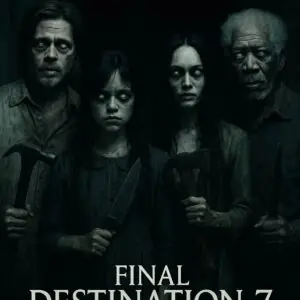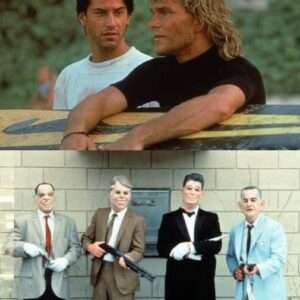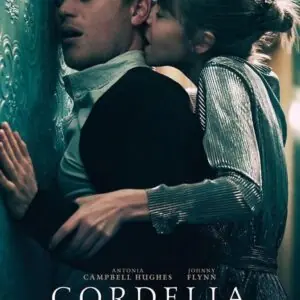Introduction
Brian De Palma’s Scarface (1983) is one of the most iconic crime films ever made. Written by Oliver Stone and starring Al Pacino in a career-defining role, the movie is a brutal, operatic tale of ambition, greed, and self-destruction. A remake of the 1932 Howard Hawks film of the same name, Scarface updates the original’s Prohibition-era gangster narrative to the cocaine-fueled underworld of 1980s Miami.
Upon its release, Scarface was met with mixed reviews, criticized for its excessive violence and over-the-top performances. However, over time, it has gained a massive cult following and is now regarded as a classic, influencing countless films, TV shows, and hip-hop culture. This review will explore the film’s themes, performances, direction, and lasting impact.
Plot Summary
Scarface follows Tony Montana (Al Pacino), a Cuban refugee who arrives in Miami during the 1980 Mariel boatlift. Ambitious and ruthless, Tony quickly rises through the criminal underworld, starting as a low-level enforcer before seizing control of a drug empire. Along the way, he becomes consumed by paranoia, greed, and cocaine, leading to his inevitable downfall.
The film’s narrative is structured like a Greek tragedy, with Tony’s hubris and unchecked ambition sealing his fate. Unlike many crime films that romanticize their protagonists, Scarface presents Tony as a deeply flawed, often unlikable figure whose brutality and ego make his demise both shocking and inevitable.
Themes and Analysis
1. The American Dream Corrupted
At its core, Scarface is a scathing critique of the American Dream. Tony Montana comes to the U.S. seeking wealth and power, believing that America rewards those who take what they want. However, his version of success is built on violence, betrayal, and moral decay. The film suggests that unchecked ambition in a capitalist society can lead to self-destruction.
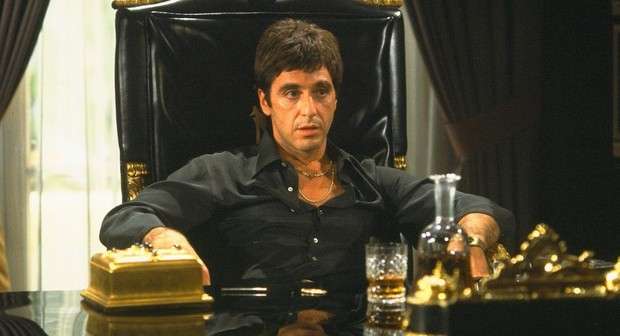
Tony’s famous line, “Say hello to my little friend!”, delivered during his final, cocaine-fueled shootout, underscores his tragic arc—he achieves everything he wanted but loses his soul in the process.
2. Excess and Decadence
The 1980s were defined by excess—Wall Street greed, lavish lifestyles, and the explosion of the cocaine trade. Scarface captures this era perfectly, with its neon-lit Miami setting, garish mansions, and mountains of cocaine. Tony’s downfall is tied directly to his addiction, both to power and to the drug that fuels his empire.
3. Loyalty and Betrayal
Tony’s relationships deteriorate as his paranoia grows. His best friend, Manny (Steven Bauer), remains loyal until Tony’s jealousy destroys their bond. His mother (Miriam Colon) disowns him, recognizing his moral decay. Even his wife, Elvira (Michelle Pfeiffer), grows to despise him. The film suggests that in the criminal world, trust is fleeting, and betrayal is inevitable.
Performances
Al Pacino as Tony Montana

Pacino delivers one of his most electrifying performances, portraying Tony with a manic intensity. His Cuban accent and larger-than-life persona have been parodied endlessly, but there’s no denying the power of his performance. Tony is charismatic yet terrifying, a man whose charm masks his brutality.
Michelle Pfeiffer as Elvira Hancock
Pfeiffer is magnetic as Tony’s icy, disillusioned wife. Elvira starts as a trophy wife but becomes a symbol of Tony’s emptiness—she’s beautiful but hollow, much like his empire.
Steven Bauer as Manny Ribera
Bauer brings depth to Manny, Tony’s loyal friend whose tragic fate underscores Tony’s descent into madness.
Supporting Cast
Robert Loggia as Frank Lopez, Tony’s initial boss, embodies the old-school gangster who underestimates Tony’s ruthlessness. F. Murray Abraham and Paul Shenar play key figures in Tony’s rise and fall, while Mary Elizabeth Mastrantonio shines as Tony’s sister, Gina, whose fate becomes a breaking point for him.
Direction and Style
Brian De Palma’s Vision
De Palma’s direction is bold and unflinching. Known for his Hitchcockian suspense and elaborate set pieces, he crafts Scarface as a hyper-stylized, almost operatic tragedy. The film’s violence is graphic but never gratuitous—it serves to emphasize the brutality of Tony’s world.
Cinematography and Production Design
The film’s visual style is decadent and lurid, with neon lighting, lavish sets, and slow-motion sequences heightening the drama. The infamous chainsaw scene is a masterclass in tension, while the climactic mansion shootout is chaotic and visceral.
Soundtrack
Giorgio Moroder’s synth-heavy score perfectly complements the film’s 80s aesthetic. The recurring Scarface theme is iconic, and songs like “Push It to the Limit” underscore Tony’s rise and fall.
Controversy and Legacy
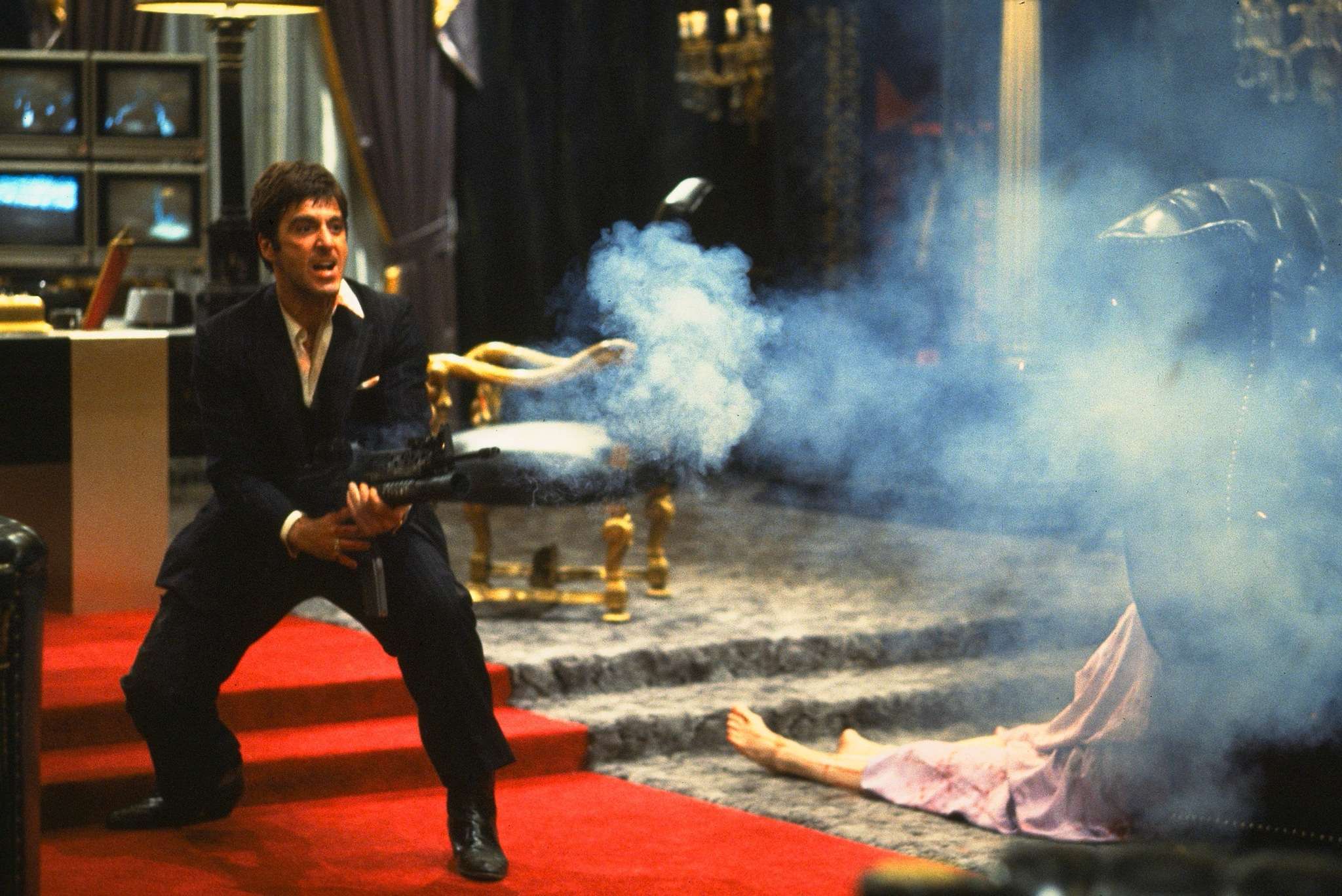
Initial Reception
Upon release, Scarface was controversial for its graphic violence, profanity, and depiction of drug use. Critics accused it of being excessive and amoral. However, its reputation grew over time, particularly among hip-hop artists who saw Tony as a symbol of hustler ambition.
Cultural Impact
Scarface has become a pop culture phenomenon. Lines like “The world is yours” and “Say hello to my little friend!” are endlessly quoted. Rappers like Nas, Jay-Z, and Pusha T reference the film constantly, and its imagery is ingrained in music videos and streetwear.
Influence on Crime Cinema
Films like Goodfellas, The Sopranos, and Breaking Bad owe a debt to Scarface’s portrayal of a criminal’s rise and fall. Unlike traditional gangster films that romanticize their protagonists, Scarface refuses to sanitize Tony’s brutality.
Criticisms
While Scarface is now a classic, it’s not without flaws:
- Pacing Issues: At nearly three hours, some scenes drag.
- Over-the-Top Acting: Pacino’s performance, while iconic, borders on caricature at times.
- Dated Elements: The 80s aesthetic, while intentional, can feel excessive to modern viewers.
Final Verdict
Scarface is a masterpiece of crime cinema—a brutal, unflinching exploration of ambition and downfall. Al Pacino’s performance is legendary, De Palma’s direction is bold, and Oliver Stone’s script is razor-sharp. While not for the faint of heart, its themes of power, corruption, and excess remain relevant today.
Rating: 9.5/10
Why You Should Watch It
- One of Pacino’s greatest performances.
- A gripping, tragic rise-and-fall story.
- Unmatched influence on pop culture.
- A visceral, unforgettable cinematic experience.
Who Might Not Like It
- Those sensitive to extreme violence.
- Viewers who prefer subtlety over bombast.
- Critics of 80s excess and stylization.
Conclusion
Forty years after its release, Scarface remains a landmark film. Its unapologetic portrayal of crime, its unforgettable performances, and its cultural staying power cement its place in cinema history. Whether you see Tony Montana as a cautionary tale or an antihero, his story is one of the most compelling in film.
“Say hello to the bad guy.” Indeed

